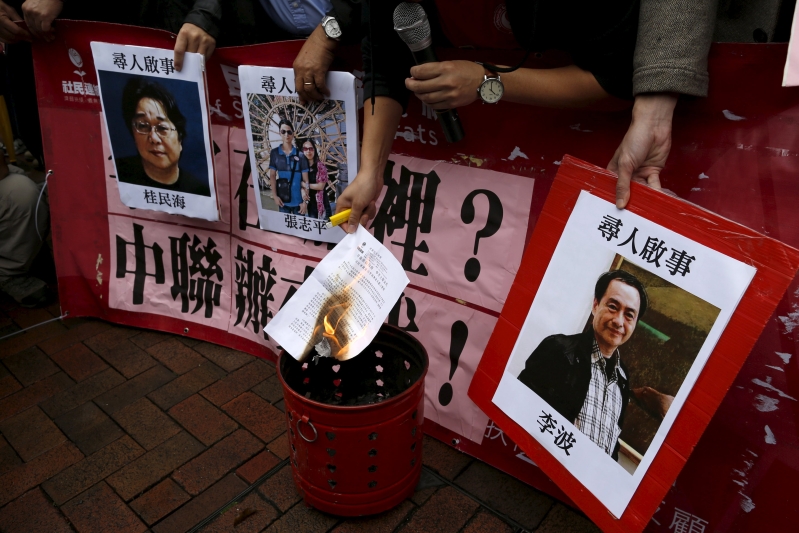
A publisher of books critical of China's leaders who went missing in Hong Kong last week has traveled to China voluntarily, his wife said on Tuesday, as Britain reminded its former colony of its commitment to press freedom.
Four other associates of the publisher that specializes in selling and publishing gossipy political books on China's Communist Party leaders have been unaccounted for since late last year.
The disappearances and China's continued silence have stoked fears of mainland Chinese authorities using shadowy tactics that erode the "one country, two systems" formula under which Hong Kong has been governed since its return to China in 1997.
Lee Bo, 65, a shareholder of Causeway Bay Books, went missing last week, amid mounting speculation he may have been taken by Chinese agents. His wife, Sophie Choi, however, withdrew a missing persons report for her husband on Monday.
"He went voluntarily so that's why ... I canceled the report," Chao said in brief comments to reporters staking out her apartment. Hong Kong police confirmed in a statement that the missing persons report had been canceled, but said they would continue investigating.
Neither Lee nor his wife could be reached by Reuters on their mobile phone numbers.
Britain confirmed on Tuesday that Lee was a British passport holder. An embassy spokesman in Beijing added in a statement that Britain was "deeply concerned" by reports of disappearances and detentions.
"We encourage the Hong Kong SAR (special administrative region) government to honor its commitment to protecting the freedom of the press, and we hope the Chinese authorities will continue to make every effort to ensure that the environment in which the media and publishers operate in the Hong Kong SAR supports full and frank reporting," the statement said.
HAMMOND SAYS AN ISSUE FOR HONG KONG
British Foreign Secretary Philip Hammond, visiting Beijing, said he had raised Lee's case with his Chinese counterpart, Wang Yi.
"Our view is that the Basic Law, the Joint Declaration, the principle of one country, two systems means that in a question of any breach of Hong Kong laws, the question must be settled in Hong Kong by the Hong Kong judicial system," Hammond told reporters.
The Basic law is Hong Kong's mini-constitution. The 1984 Joint Declaration provided for the handover of power in Hong Kong from Britain to China.
"We would hope that wherever Mr. Lee is, if he is charged with any offences, those offences would be tried in Hong Kong."
Asked whether China would recognize the British passport, Wang said: "On the specific case you mentioned, based on the Basic Law of Hong Kong and China's nationality law, this person in question is first and foremost a Chinese citizen."
Wang said that it was "not necessary to make groundless speculation" before the individual, his family, the Hong Kong and Central governments make official statements. He did not respond to a question on whether the booksellers had been detained by Chinese authorities.
Britain handed the global financial hub back to China under an agreement that its core liberties and way of life - including freedom of speech and an independent judiciary - continue for 50 years.
In a handwritten note dated January 3 and purportedly written and signed by Lee, photos of which were widely circulated on social and local media but couldn't be verified by Reuters, Lee wrote that he had traveled back to China in order to assist with an unspecified "investigation".
An officer at the Public Security Bureau in Shenzhen, just over the border from Hong Kong in China's Guangdong province, told Reuters he'd been instructed by his supervisors to say he wasn't aware of the case. The Guangdong provincial Public Security Bureau said it wasn't aware of the situation and referred inquiries to the Guangdong propaganda department.
"I don't know anything about this," said Deng Hong, a deputy director of Guangdong's Information Office when contacted by Reuters. The office gave no immediate response to faxed questions seeking further details on Lee's whereabouts or his involvement in any investigations.
Several trenchant editorials by China's state media fueled public concern in Hong Kong that China might be tightening its grip on the city. Hong Kong leader Leung Chun-ying said it would be "unacceptable" and unconstitutional if Chinese agents were found to have been involved.
China's state-run Global Times wrote that many of the books published by Lee's firm had "maliciously fabricated content" that stoked political rumors in mainland China and caused an "evil influence".
Lee had told Reuters in November that the men had likely been arrested because of a "new book they are going to publish". He did not elaborate.







